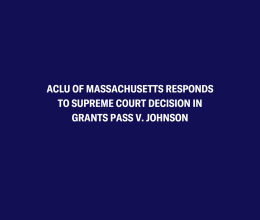In Commonwealth v. Laltaprasad, the Commonwealth is appealing a 2½-year sentence imposed by Middlesex Superior Court Judge Shannon Frison on ACLU of Massachusetts client Imran Laltaprasad. Although the statutory minimum was 3½ years for Mr. Laltaprasad’s drug offenses, Judge Frison ruled that this sentence was inappropriate because Mr. Laltaprasad was responsible for only small amounts of drugs and because he had been grievously hurt—including having his leg amputated—in an incident that preceded his offenses.
While the Commonwealth claims that judges can never impose below-minimum sentences, that is not so. In 1996, the state legislature enacted a safety valve that permits sentences below the otherwise applicable statutory minimum if a judge deems the minimum inappropriate. This law authorized Judge Frison to impose a 2½-year sentence in this case. Her sentence should be upheld not only because it complies with this statute, but also because mandatory minimum sentencing in Massachusetts has proved to be racially discriminatory, disproportionate, and therefore unconstitutional.
Accordingly, we are asking the Supreme Judicial Court to affirm that in cases involving mitigating facts, such as Mr. Laltaprasad’s case, judges have both statutory and constitutional authorities to sentence below the minimum.
Watch the April 5th argument before the Massachusetts Supreme Judicial Court.





